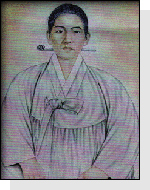- Park In- hwan (1926~1956)
- Park Su- geun (1914~1965)
- Kim Yu- jeong (1908~1937)
- Lee Hyo- seok (pen name Gasan) (1907~1942)
- Kim Dong- myeong (Choheo) (1901~1968)
- Han Yong- un (Buddhist name Manhae) (1897~1944)
- Namgung Eok (pen name Hanseo) (1863~1939)
- Yun Hui- sun (1860~1935)
- Yu In- seok (pen name Uiam) (1842~1915)
- Kim Byeong- yeon (pen name Nango) (1807~1863)
- Nam Gu- man (pen name Yakcheon) (1629~1711)
- Heo Mok (pen name Misu) (1595~1682)
- Heo Gyun (pen name Gyosan) (1569~1618)
- Heo Cho- hui (pen name Nanseolheon) (1563~1589)
- Sinsaimdang (1504~1551)
- Kim Si- seup (pen name Maewoldang) (1434~1493)
- Won Cheon- seok (pen name Ungok) (1330~ ?)
- Lee Seung- hyu (pen name Dongangeosa) (1224~1300)
Yun Hui-sun (1860~1935)

Woman fighter for the national independence, she, at 16, was married to Yu Je-won living at Nammyon, Chunche.
Her ancestry was rooted in Haeju. In 1895 (23rd year of King Gojong),
when volunteer soldiers of Chuncheon fought in areas of Chuncheon and Gapyeong, she composed dozens of songs with the theme of volunteer soldiers,
boosting the morale of soldiers, and also helped the soldiers by cooking and doing laundry.
In 1907 (first year of Yunghui) when Jeongmi volunteer troops were raised,
and 600 volunteers including her father-in-law Yu Hong-seok fought at Hanggol, Gajeong-ri, Chuncheon,
Yun Hui-sun raised campaign funds and installed a factory for manufacturing weapons at Jusan in Yeouinaegol.
In 1911, the year after Japan forcefully annexed Korea, she sought asylum in Manchuria and continued to fight against the Japanese military. However, her father-in-law and her husband died a patriotic death and, in July 1935, even her son Yu Don-sang died for the independence of the father land. At 76, she died after helping volunteer soldiers for three generations. Helped by the government, her remains were returned to be buried together with her husband Yu Je-won at her ancestors´ tomb site on October 20, 1994. In memory of her feats, the government posthumously awarded a presidential citation to her, and decorated her with the National Medal of Order of Merit for National Foundation.
In 1911, the year after Japan forcefully annexed Korea, she sought asylum in Manchuria and continued to fight against the Japanese military. However, her father-in-law and her husband died a patriotic death and, in July 1935, even her son Yu Don-sang died for the independence of the father land. At 76, she died after helping volunteer soldiers for three generations. Helped by the government, her remains were returned to be buried together with her husband Yu Je-won at her ancestors´ tomb site on October 20, 1994. In memory of her feats, the government posthumously awarded a presidential citation to her, and decorated her with the National Medal of Order of Merit for National Foundation.
최근 업데이트 2023-01-10


